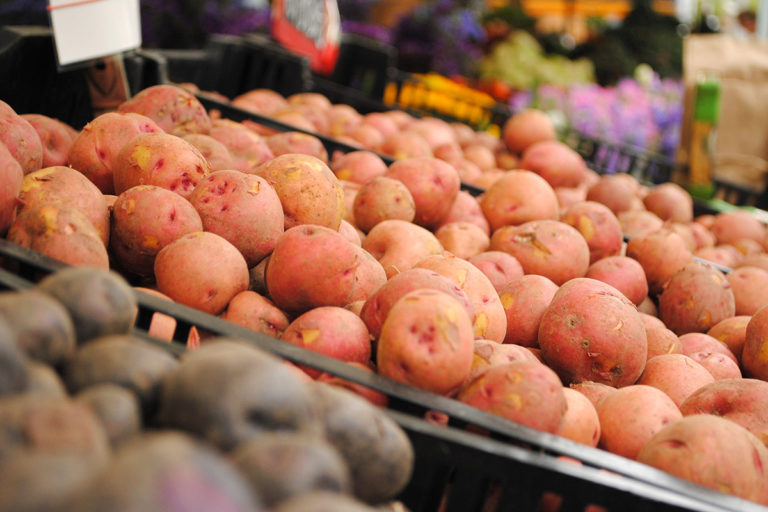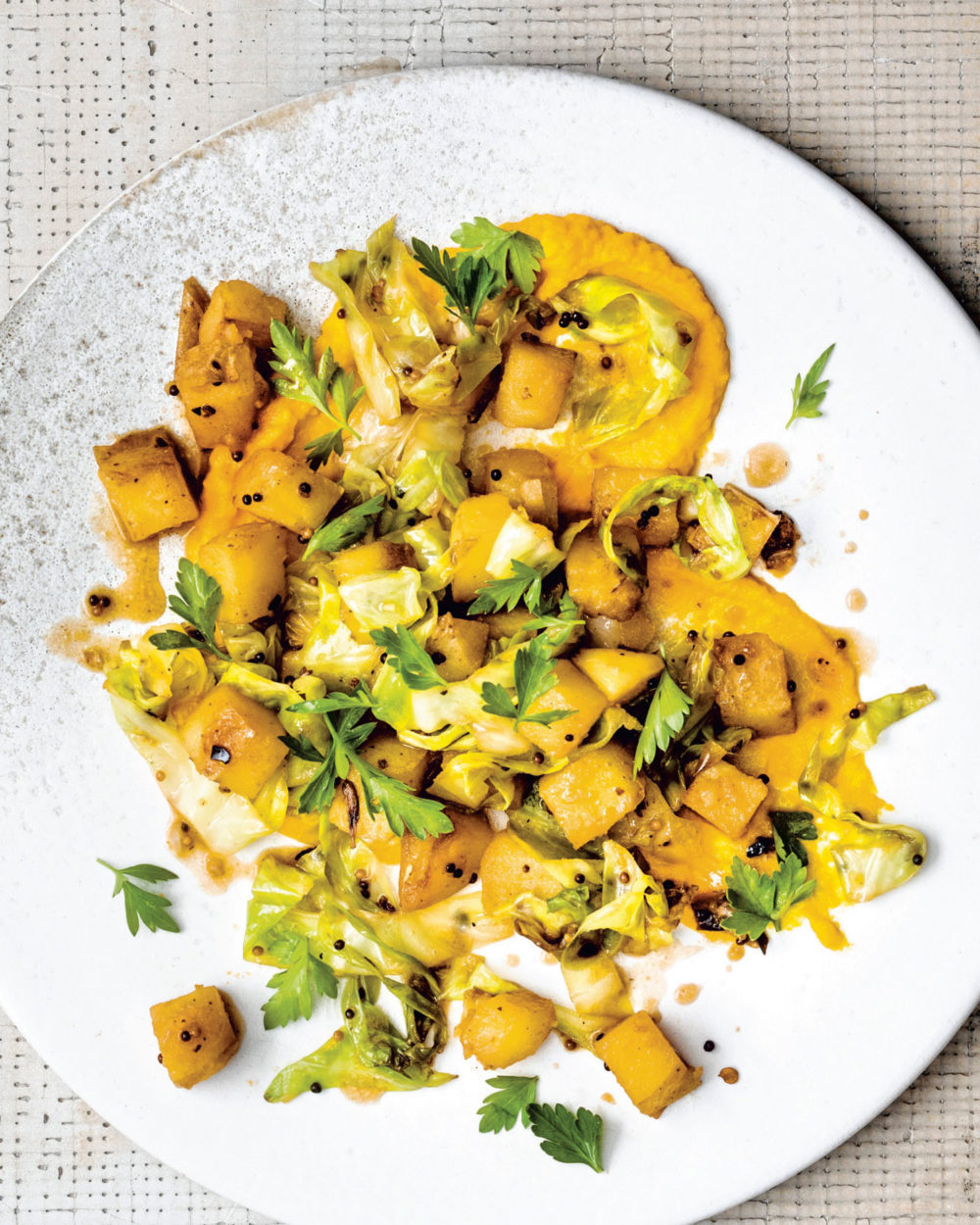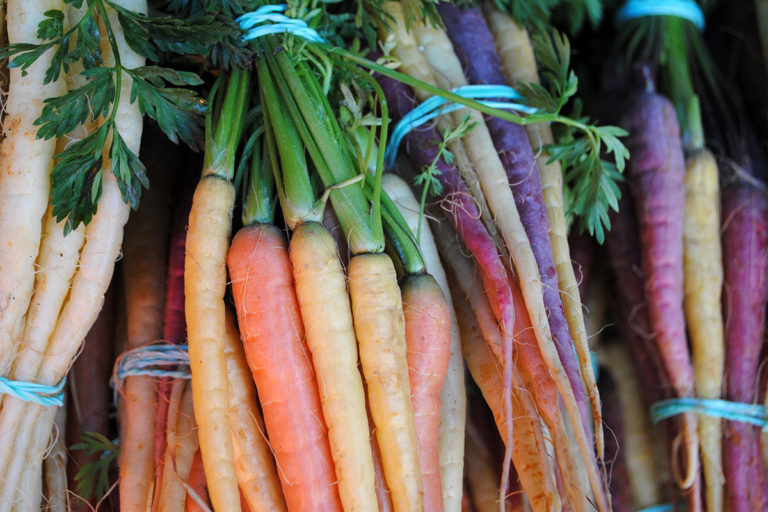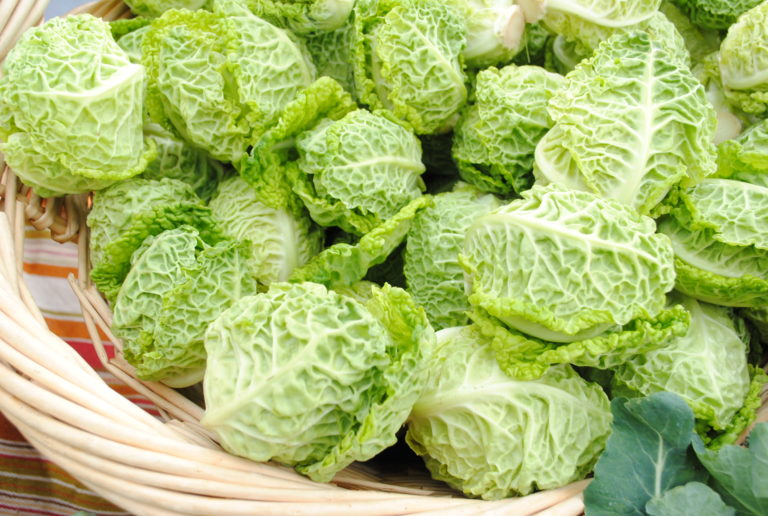
Sautéed Cabbage and Roasted Potatoes with Carrot Purée
Source: Bryant Terry, Vegetable Kingdom

Recipe Type: Entrees | Seasons: Autumn, Winter
Reprinted with permission from Vegetable Kingdom: The Abundant World of Vegan Recipes by the Bryant Terry, copyright © 2020. Published by Ten Speed Press, an imprint of Penguin Random House. Photography copyright: Ed Anderson © 2020.
The initial inspiration for this recipe was atakilt, a hearty Ethiopian dish of slow-cooked potatoes, cabbage, and carrots. Here I roast cubes of potatoes until just crisp so they remain firm and hold up while being sautéed with the cabbage. Rather than adding cut carrots to the mix, I smear a carrot puree onto the serving plate and pile the cabbage and potatoes on top. The carrot puree visually brightens the dish and adds a “saucy” element. To pull everything together, I created a spicy and acidic ginger-habanero vinegar. The vinegar has more of a Caribbean flavor profile, so I see this as an East-Africa-meets-West-Indies mash-up. When prepping, be meticulous about cutting the potatoes into equal-size ½-inch cubes (as precise as you can get them). This facilitates even roasting and provides consistency in each bite.
Makes 4 servings
INGREDIENTS
2 pounds Yukon gold potatoes, cut into ½-inch cubes
4 tablespoons extra-virgin olive oil
2 teaspoons coarse sea salt, plus more as needed
Freshly ground white pepper
1 pound carrots, thinly sliced
1 teaspoon red wine vinegar, plus more as needed
2 teaspoons brown mustard seeds
¼ to ½ teaspoon red pepper flakes
1 teaspoon raw cane sugar
8 ounces green cabbage, cored and thinly sliced
6 tablespoons vegetable stock or water
Ginger-Habanero Vinegar (see separate recipe)
½ cup loosely packed fresh flat-leaf parsley leaves, for garnish
PREPARATION
Preheat the oven to 450°F. Line a baking sheet with parchment paper.
In a large bowl, combine the potatoes, 1 tablespoon of the olive oil, 1 teaspoon of the salt, and a few turns of white pepper and toss well with clean hands to combine. Spread the potatoes over the prepared baking sheet in one layer and roast until tender and starting to turn golden on the edges, 35 to 40 minutes.
While the potatoes are roasting, in a medium saucepan, combine the carrots, ¾ cup water, and ½ teaspoon of the salt. Bring to a boil over medium-high heat, stir, and quickly decrease the heat to medium-low. Partially cover and steam the carrots until tender, about 15 minutes. Drain the carrots in a colander and let them sit until they have dried, about 20 minutes.
Transfer the carrots to a blender, add the red wine vinegar and 1 tablespoon of the olive oil, and puree until smooth, adding a little water if necessary. Taste, add more vinegar to brighten the puree, if necessary, and season with salt and white pepper. Set aside.
Heat a large sauté pan over medium heat. Add the remaining 2 tablespoons olive oil, the mustard seeds, red pepper flakes, sugar, and remaining ½ teaspoon salt. Simmer, stirring frequently to prevent the spices from burning, until the mustard seeds start to pop, about 2 minutes. Quickly add the cabbage and sauté, stirring often, until completely wilted, about 3 minutes. Add the stock and the roasted potatoes and gently toss to combine. Cover and cook until most of the liquid has evaporated, about 4 minutes. Season with salt and white pepper to taste.
To serve, slather the carrot puree over four plates, scoop a mound of the sautéed cabbage and potatoes on top, and generously sprinkle with ginger-habanero vinegar. Garnish with the parsley leaves and serve.
Music: “Wubit” by Mulatu Astatke & Black Jesus Experience from Cradle of Humanity
Ginger-Habanero Vinegar
Makes about 1 cup
INGREDIENTS
3 habanero chiles, stemmed and seeded
½ cup unseasoned rice vinegar
½ cup distilled white vinegar
1½ teaspoons minced fresh ginger
1 teaspoon raw cane sugar
Pinch of kosher salt
PREPARATION
Place the chiles in a heatproof bowl. In a small saucepan, combine the vinegars, ginger, sugar, and salt and bring to a boil over high heat. Immediately pour the vinegar mixture over the chiles and let cool completely. Transfer to a jar, seal, and store at room temperature for up to 1 year.



